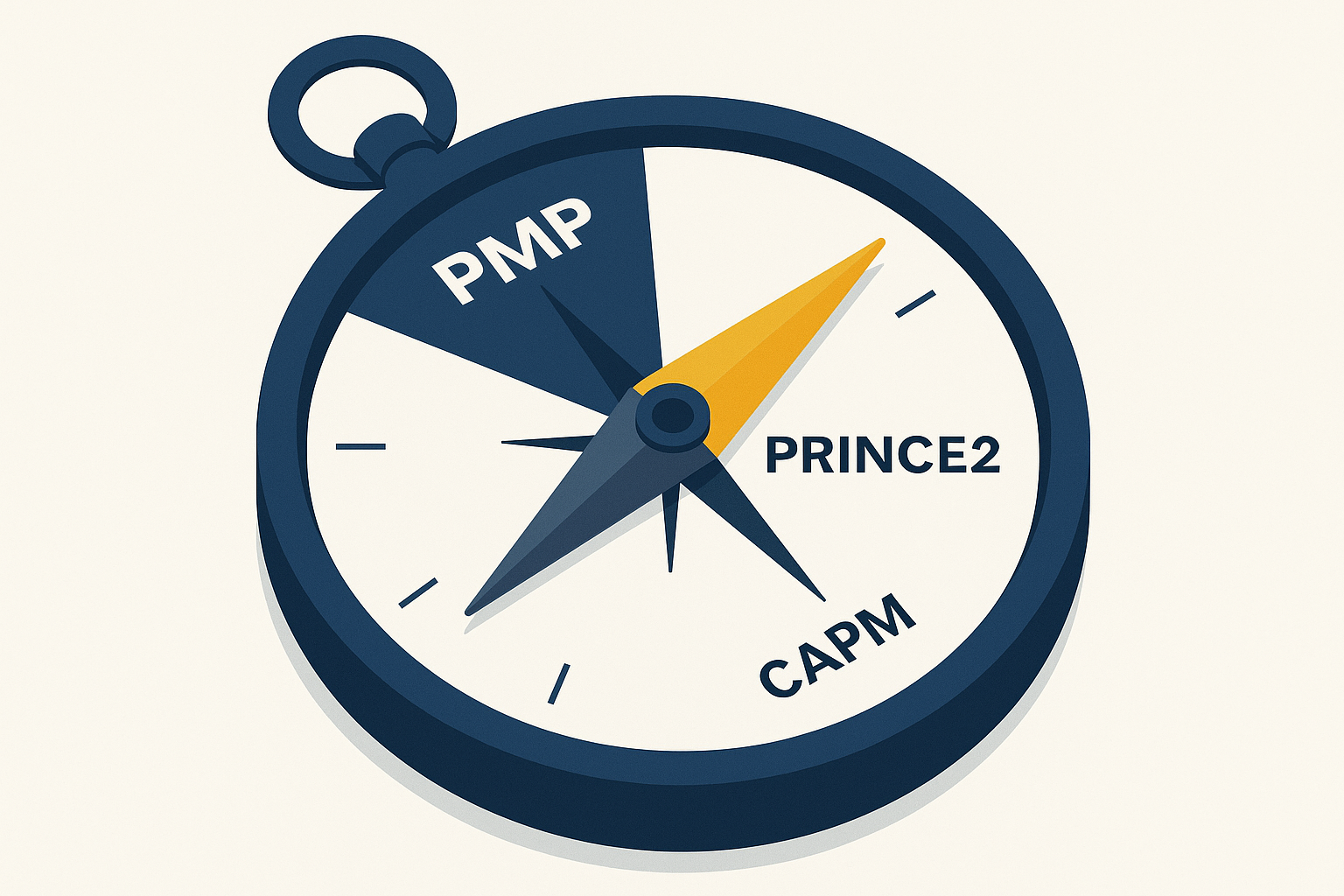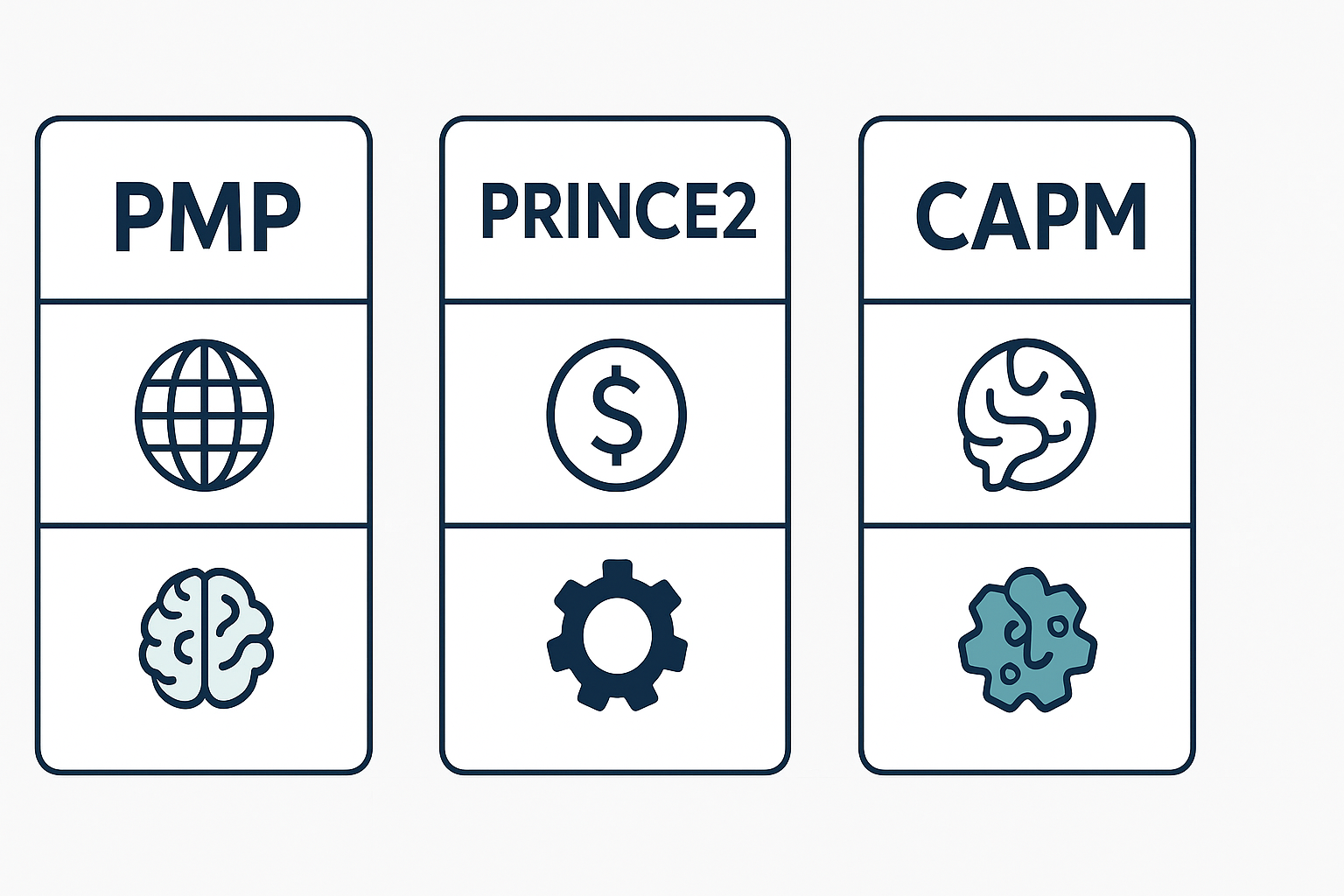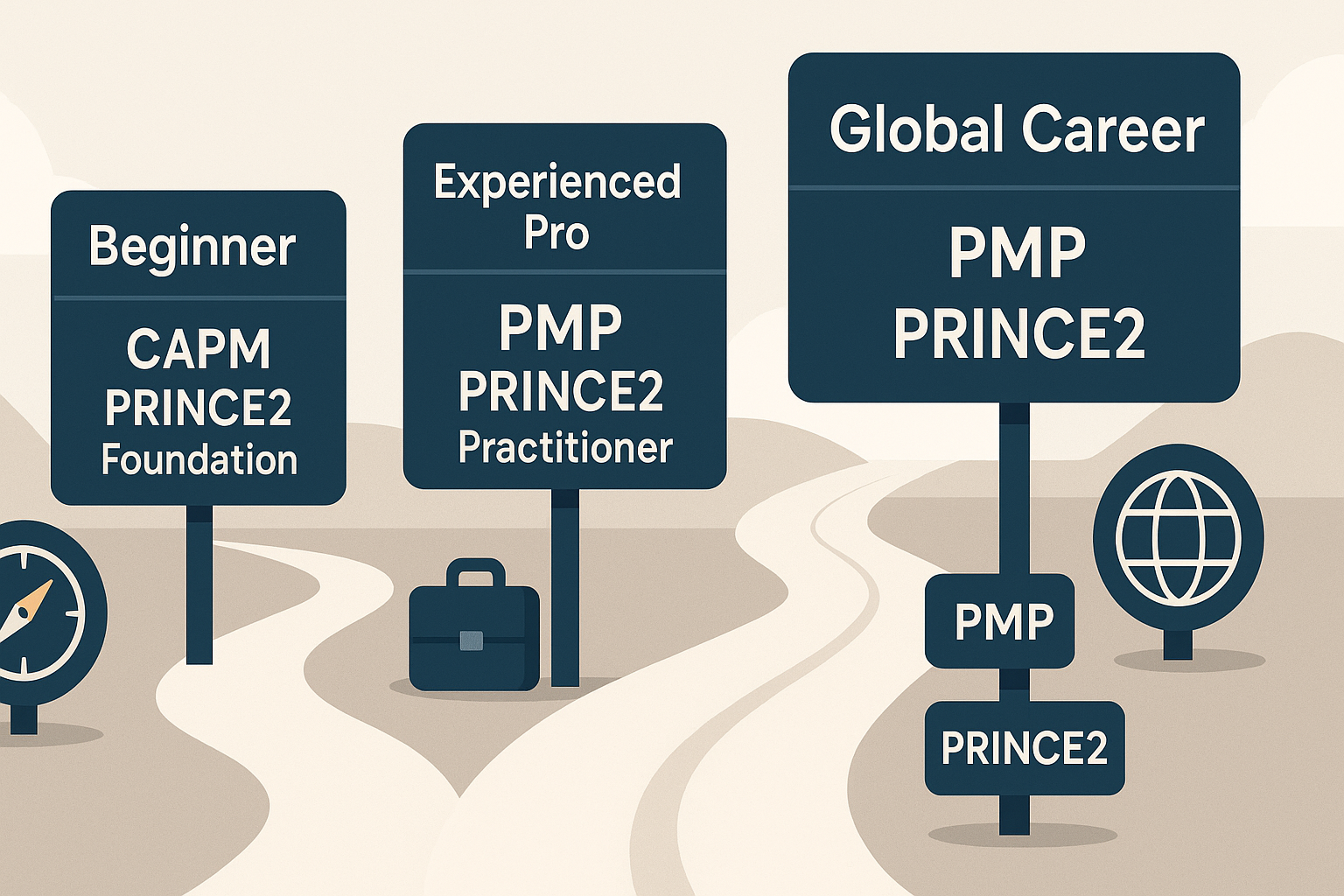Why Bother with a Project Management Certification in 2025?
Let’s be honest: the working world is more complex than ever. Companies are juggling massive projects, digital tools are changing by the minute, and the pressure to deliver results is constant. This is where skilled project managers come in—they’re the ones who bring order to the chaos.
And the demand for them is exploding. By 2027, employers will need to fill nearly 88 million project management-related roles. It doesn’t matter if you’re in tech, construction, healthcare, or marketing; the ability to plan, manage risk, and lead a team is a golden ticket.
This demand directly translates to better pay. On average, certified project managers earn between 22% and 33% more than their non-certified colleagues. But it’s not just about the money. A certification gives you credibility, boosts your confidence, and opens doors to senior roles and global opportunities.
Think of it from a hiring manager’s perspective. When they see a credential like PMP® or PRINCE2® on a resume, it’s a clear signal that you’ve invested in your career. In a competitive market, it’s often the filter that gets your resume to the top of the pile. This guide will help you navigate the three biggest names in the game: PMP®, PRINCE2®, and CAPM®.
The Gold Standard: A Deep Dive into the PMP® (Project Management Professional)
When people talk about project management certifications, the PMP® is usually the first one that comes to mind. Offered by the Project Management Institute (PMI), it’s widely seen as the global gold standard. It’s a knowledge-based credential that proves you can lead projects and teams, no matter the industry or method.
What It’s All About
The PMP isn’t about memorizing one rigid way of doing things. It’s built on the principles in the PMBOK® Guide but has evolved to cover the three main approaches used today: traditional (waterfall), agile, and hybrid. This makes PMP holders incredibly versatile, because they have the toolkit to handle any situation a project throws at them.
Who It’s For
The PMP is designed for professionals who already have significant, real-world experience leading projects. It’s the certification you get to validate your years of hard work, move into senior leadership, and command the highest salary in the field. This isn’t for beginners; it’s a capstone for the seasoned pro.
Getting in the Door: The Prerequisites
PMI has strict requirements to make sure only qualified professionals can take the exam. You’ll need to meet one of these two criteria:
- If you have a four-year degree:
- At least 36 months of experience leading projects.
- 35 hours of formal project management training.
- If you have a high school diploma or associate’s degree:
- At least 60 months of experience leading projects.
- 35 hours of formal project management training.
Good to know: If you already have the CAPM® certification, it automatically fulfills the 35-hour training requirement, creating a clear path forward.
Budgeting for the PMP
Getting your PMP is a real investment, typically costing between $1,200 and $5,500. Here’s a rough breakdown:
- Exam Fee: $405 for PMI members, $555 for non-members. Some sources suggest this might rise slightly in 2025.
- PMI Membership: $139 to join (which includes a $10 application fee) and $129 to renew each year. Membership saves you money on the exam and gives you a free digital copy of the PMBOK® Guide.
- Training: This is your biggest variable. The required 35 hours can cost anywhere from $300 for a self-paced online course to over $3,500 for an intensive boot camp.
- Study Materials: Factor in another $100 to $400 for practice exams and prep books.
The PMP Exam: What to Expect
The PMP exam is tough. It tests not just what you know, but how you apply it in the real world.
- Format: 180 questions in 230 minutes (just under 4 hours), with two 10-minute breaks.
- Question Types: It’s more than just multiple-choice. You’ll see matching, hotspot, and fill-in-the-blank questions, too.
- Content: The exam is broken down into three domains that reflect what modern project managers actually do:
- People (42%): All about soft skills—leading teams, managing conflict, and engaging stakeholders.
- Process (50%): The technical side of things—planning, scheduling, managing risk, and ensuring quality.
- Business Environment (8%): Connecting your project to the big picture—company strategy, compliance, and delivering real value.
- Difficulty: It’s a challenging exam, with first-time pass rates estimated around 50-55%. Most people spend between 60 and 120 hours studying over two to six months.
The Payoff: Is It Worth It?
Absolutely. PMP holders earn a median salary that’s 22% to 33% higher than their non-certified peers. In the U.S., average salaries for PMP-certified professionals are consistently over $100,000, with many sources citing averages between $111,000 and $122,388. It’s the key to unlocking senior roles like Project Director or Program Manager.
But the real value is in the process. The application forces you to look back and quantify your experience, which is a powerful exercise on its own. And studying for the situational questions teaches you a new way of thinking—a structured approach that can turn a good project manager into a great one.
The Methodical Pro: A Look at PRINCE2®
While the PMP is about what you know, PRINCE2® is about how you do it. It’s a process-based methodology that gives you a structured, step-by-step recipe for managing a project.
What It’s All About
PRINCE2® stands for PRojects IN Controlled Environments. It’s a detailed roadmap for running a project from start to finish, with a heavy focus on business justification, clear roles, and managing the project in stages. Think of it less as a library of knowledge and more as a playbook for delivering a project in a controlled, organized way.
The Two-Step Journey: Foundation vs. Practitioner
PRINCE2 is broken into two levels, creating a clear path for growth:
- PRINCE2 Foundation: This is where you start. It confirms you understand the PRINCE2 method, its terminology, and its processes. It’s perfect for anyone who will be working as part of a project team using the methodology.
- PRINCE2 Practitioner: This is the advanced level. It proves you can not only understand the method but also apply and tailor it to a real-world project. This is where you move from theory to practice.
Getting Started: The Prerequisites
One of the best things about PRINCE2 is how accessible it is.
- Foundation: There are no prerequisites to take the Foundation exam. You can start with zero experience.
- Practitioner: You need to have passed the Foundation exam first. However, they also accept other major certifications like the PMP® and CAPM® as prerequisites, which is a nice nod to industry cross-compatibility.
Budgeting for PRINCE2
The cost can vary quite a bit depending on your country and training provider.
- Most people buy a training and exam bundle. An online, self-paced Foundation course can start around £731 (about $900 USD).
- A combined Foundation and Practitioner package is usually the best deal, ranging from $900 to over $2,500.
- If you just want to buy the exam voucher, expect to pay between $300 and $500 for each level.
The Exams: A Tale of Two Tests
The exams for the two levels are very different.
- Foundation Exam: This is a 60-minute, closed-book exam with 60 multiple-choice questions. It’s a straightforward test of your knowledge, and you need to get 33 questions right (55%) to pass.
- Practitioner Exam: This is a tougher, 2.5-hour open-book exam (you can only use the official PRINCE2 manual). It has 68 scenario-based questions that test your ability to apply the method. You need 38 correct answers (55%) to pass.
The Payoff: A Geographic Advantage
The value of PRINCE2 is heavily tied to where you work. It’s the go-to standard in the UK, much of Europe, and Australia, especially for government and public sector jobs. In these regions, it’s often a must-have.
Salaries are strong in these markets. In the UK, a PRINCE2 Practitioner can earn between £50,000 and £72,000 (about $63,000 to $91,000 USD). While it’s recognized in the U.S., the PMP is far more common, and PRINCE2 salaries there tend to be a bit lower, averaging around $99,000.
The real strength of PRINCE2 is that it creates a common language and a standardized framework across an entire organization. This makes it invaluable for companies that need consistent, auditable processes—which is why it’s so popular in government.
The Smart Start: Getting Going with CAPM®
For anyone just starting their project management journey, the Certified Associate in Project Management (CAPM)® is the perfect entry point. It’s a foundational credential from PMI that offers a clear and accessible path into the profession.
What It’s All About
The CAPM is designed to show that you understand the fundamental knowledge, terminology, and processes of project management. It’s a formal introduction to the principles in the PMBOK® Guide and is explicitly designed as a stepping stone to the PMP.
Who It’s For
The CAPM is perfect for people with little to no project management experience. This includes recent grads, professionals looking to switch careers, and team members like project coordinators or analysts who want to formalize their skills.
Getting Started: Simple Prerequisites
The requirements are designed to be easy to meet, removing the experience barrier of the PMP:
- A high school diploma or equivalent.
- 23 hours of formal project management education, which you have to complete before the exam.
You can meet the education requirement with affordable online courses, like the Google Project Management: Professional Certificate, which makes it very accessible.
Budgeting for the CAPM
Compared to the PMP, the CAPM is much more affordable, making it a low-risk way to get started.
- Exam Fee: $225 for PMI members, $300 for non-members.
- Training: The 23 hours of education can be very inexpensive, with some online programs fulfilling the requirement for a low monthly fee.
Your total investment could be just a few hundred dollars, making it one of the most cost-effective credentials out there.
The CAPM Exam: What to Expect
The CAPM exam checks your understanding of core project management concepts.
- Format: 150 multiple-choice questions in 3 hours.
- Content: The exam covers four key areas, giving you a well-rounded foundation:
- Project Management Fundamentals (36%)
- Predictive, Plan-Based Methods (17%)
- Agile Frameworks (20%)
- Business Analysis Frameworks (27%)
- Difficulty: The CAPM is much less difficult than the PMP. It tests what you know, while the PMP tests how you apply that knowledge in tricky situations.
The Payoff: Building Your Future
The CAPM opens the door to entry-level roles like Project Coordinator or Project Analyst, with average U.S. salaries ranging from $68,000 to $92,000.
But its biggest value might be as a direct on-ramp to the PMP. Earning your CAPM fulfills the 35-hour education requirement for the PMP, giving you a huge head start once you have enough experience. Think of it as a “career test drive”—a low-cost, low-risk way to see if project management is the right long-term path for you.
The Side-by-Side Showdown: PMP vs. PRINCE2 vs. CAPM
Sometimes, you just need to see it all laid out. Use this chart to quickly compare the three certifications and see which one aligns best with your experience, budget, and career goals.
Project Management Certification Decision Matrix
Your Personal Roadmap: Which Certification is Right for You?
Choosing the right certification is a strategic move. Here’s some straightforward advice based on where you are in your career.
For the Aspiring PM Just Starting Out
- Your Profile: You’re a recent grad, changing careers, or in a junior role with little to no formal project experience.
- Your Choice: CAPM® or PRINCE2® Foundation.
- Go for CAPM if: You plan to work in North America or for a global company that uses PMI standards. If your ultimate goal is the PMP, the CAPM is the most logical first step.
- Go for PRINCE2 Foundation if: Your career is focused on the UK, Europe, or Australia, or you’re targeting a government or public sector job. It’s perfect for environments that value structure and control.
For the Experienced Pro Looking to Level Up
- Your Profile: You have 3-5 years of hands-on experience managing projects but no formal certification. You want to move up, earn more, and get recognized for your skills.
- Your Choice: PMP® or PRINCE2® Practitioner.
- Go for PMP if: You want maximum global recognition, career mobility, and the biggest salary boost. It’s the undisputed leader in the Americas and Asia and is seen as the top achievement for project managers worldwide.
- Go for PRINCE2 Practitioner if: You work primarily in the UK, Europe, or Australia, or for an organization that has standardized on the PRINCE2 method. It shows you’ve mastered a specific, powerful way of delivering projects.
The Global Nomad with International Ambitions
- Your Profile: You want a career that lets you work in different countries and industries.
- Your Choice: It depends on where you want to go.
- The PMP® is the closest thing to a “global passport.” It’s dominant in the U.S., Canada, the Middle East, and much of Asia, making it incredibly versatile.
- The PRINCE2® Practitioner is essential if you’re serious about a long-term career in the UK public sector or with many large European companies.
- For the ultimate flexibility, especially for senior consultants, getting both the PMP and PRINCE2 Practitioner is a power move. It signals that you’ve mastered both the world’s leading framework and its top methodology, making you valuable in any environment.
Frequently Asked Questions (FAQs)
Q: Is PMP “better” than PRINCE2?
A: No, they’re just different tools for different jobs. PMP is a broad knowledge-based framework, while PRINCE2 is a specific, process-based methodology. The “better” one depends on your location, industry, and goals.
Q: How do I keep my certification active?
A: All three require you to keep learning. For the PMP, you need to earn 60 Professional Development Units (PDUs) every three years. For the CAPM, it’s 15 PDUs every three years. The PRINCE2 Practitioner, you need to either retake the exam every three years or maintain it through membership and PDUs.
Q: How long does it really take to study?
A: It varies, but a good rule of thumb is: PMP requires 60-120+ hours of serious study. CAPM usually takes 25-30 hours. A combined PRINCE2 Foundation and Practitioner course involves about 32 hours of training, plus your own review time.
Q: Is it worth getting both PMP and PRINCE2?
A: For most people, one is enough. But if you’re a senior consultant or work on international projects that span different regions and methods, holding both makes you exceptionally versatile and valuable.
Q: Can I take the PMP exam without the required experience?
A: No. PMI is very strict about the experience requirement and even conducts random audits. The CAPM is the official PMI path for professionals who don’t yet meet the PMP experience criteria.
Q: Which certification has the best ROI?
A: In terms of a direct global salary bump, the PMP usually offers the highest return. But ROI is all about context. If you want a government job in the UK, a PRINCE2 certification might be the only way to get in the door, making its ROI priceless in that situation.
Conclusion: Charting Your Course
Choosing a project management certification can feel overwhelming, but it gets a lot simpler when you think about your own career strategy. There is no single “best” certification—only the one that’s best for you. The PMP® is the global benchmark for experienced leaders, PRINCE2® is a masterclass in methodology for specific markets, and the CAPM® is the perfect launchpad for newcomers.
By looking at your experience, budget, and where you want to go, you can make a smart choice that will not only build your skills but also accelerate your career in 2025 and beyond.
As you map out your professional development, you might also be interested in exploring other foundational credentials. Check out our guide to the Best IT Certifications for Beginners to broaden your skill set.







[…] the automated filters and into the hands of a real person. This guide will walk you through the best digital marketing certifications for 2025, helping you choose the right one to invest in your […]